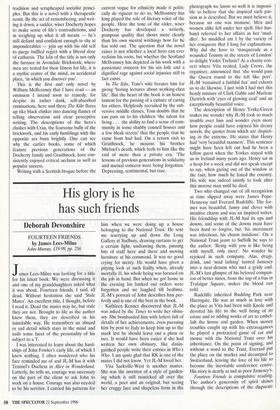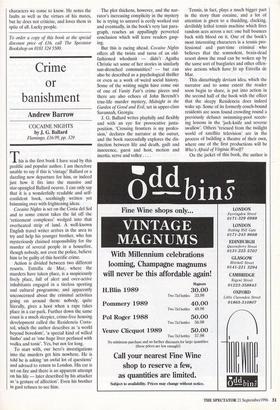His glory is he has such friends
Deborah Devonshire
FOURTEEN FRIENDS by James Lees-Milne John Murray, £19.99, pp. 256 James Lees-Milne was looking for a title for his latest book. We were discussing it and one of my granddaughters asked what it was about. Fourteen friends, I said, all dead. Without hesitation she said 'Stale Mates'. An excellent title, I thought, before I read it. Dead the mates may be, but stale they are not. Brought to life as the author knew them, they are described in his inimitable way. He remembers an absurd or sad detail which stays in the mind and nails some facet of the personality of his subject to a T.
I was interested to learn about the hard- ships of John Fowler's early life, of which I knew nothing. I often wondered who his face reminded me of and JL-M has it with Tenniel's Duchess in Alice in Wonderland. Latterly, he tells us, courage was necessary on the part of the client to ask John to work on a house. Courage was also needed to be his servitor. I carried his patterns for
him when we were doing up a house belonging to the National Trust. He sent me scurrying up and down the Long Gallery at Sudbury, drawing curtains to get a certain light, undrawing them, pinning bits of stuff here and there and moving furniture at his command. It was no good crying for mercy. He would have given a pitying look at such frailty when, already mortally ill, his whole being was focused on the job in hand. But when we got home in the evening his barked out orders were forgotten and we laughed till bedtime. JL-M's portrait of John describes him per- fectly and is one of the best in the book.
Kathleen Kennet discovered that JL-M was asked by the Times to write her obitu- ary. She bombarded him with letters full of details of her achievements, even pursuing him by post to Italy to keep him up to the mark lest he should leave out a plum or two. It would have been easier if she had written her own obituary, like distin- guished people write their entries in Who's Who. I am quite glad that KK is one of the mates I did not know. Yet JL-M loved her.
Vita Sackville-West is another matter. She was the inventor of a style of garden- ing which is still mimicked all over the world, a poet and an original, but seeing her craggy face and shapeless form in the photograph we know so well it is impossi- ble to believe that she inspired such pas- sion as is described. But we must believe it, because no one was immune. Men and women alike fell under her spell. Her hus- band referred to her affairs as her 'mud- dles'. So muddled am I by the variety of her conquests that I long for explanations. Why did she have to 'masquerade as a wounded Tommy in the streets of London' to delight Violet Trefusis? At a charity con- cert where Vita recited, Lady Crewe, the organiser, announced that 'she would pass the Queen round to the left like port'. JL-M 'remained a faithful fan' and exhorts us to do likewise. I just wish I had met this heady mixture of Clark Gable and Marlene Dietrich with 'eyes of glowing coal' and an exceptionally beautiful voice.
The description of Henry Yorke/Green makes me wonder why JL-M took so much trouble over him and wonder even more how people could have enjoyed his dreary novels, the quotes from which are dispirit- ing in the extreme. He states that Henry had 'very beautiful manners'. This sentence might have been left out had he been a fellow guest when the Yorkes stayed with us in Ireland many years ago. Henry sat in a heap for a week and did not speak except to say, when gazing out of the window at the rain, how much he hated the country. His wife was indeed saintly to look after this morose man until he died.
Two who changed out of all recognition as time slipped away were James Pope- Hennessy and Evcrard Radcliffe. The for- mer was beautiful, funny and clever with intuitive charm and was an inspired writer. His friendship with JL-M had its ups and downs, and some of the downs must have been hard to forgive, but 'his merriment was infectious, his charm insidious'. On a National Trust jaunt to Suffolk he says to the author: 'Being with you is like being with myself, only nicer'. No wonder he rejoiced in such company. Alas, drugs, drink, and 'mad larking' turned Jamesey into a near-demon who met a grisly end. JL-M's last glimpse of his beloved compan- ion of better times, from the top of a bus in Trafalgar Square, makes the blood run cold.
Radcliffe inherited Rudding Park near Harrogate. He was as much in love with the place as Vita had been with Knole and devoted his life to the well being of its estate and to adding works of art to embel- lish the house and garden. When money troubles caught up with his extravagances he played a protracted game of cat and mouse with the National Trust over his inheritance. On the point of signing, and without a word to the Trust, Everard put the place on the market and decamped to Switzerland, leaving the love of his life to become the inevitable conference centre. His story is nearly as sad as poor Jamesey's• Fourteen Friends is compulsive reading. The author's generosity of spirit shines through the descriptions of the disparate
characters we come to know. He notes the faults as well as the virtues of his mates, but he does not criticise, and loves them in spite of all. Lucky people.
To order a copy of this book at the special discount price of E16, call The Spectator Bookshop on 0181 324 5500.



















































































 Previous page
Previous page